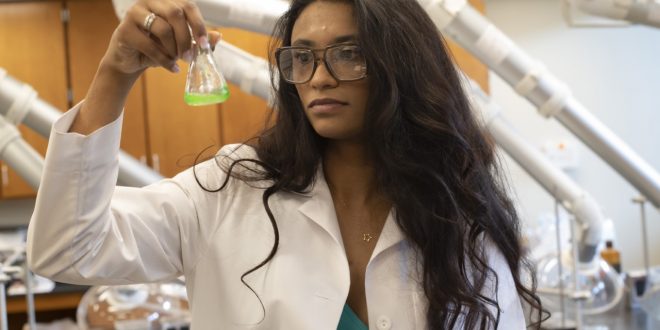Dr. Thomas Manning, VSU chemistry professor, has spent the last two months developing an antiviral application with some of his students that can potentially treat COVID-19.
Before COVID-19 struck the U.S., Dr. Manning and his students focused on developing a patent application for cancer and tuberculosis.
“We’ve been doing drug development for about 20 years. The number one focus has been mostly cancer drugs and about maybe 12 years ago we started doing more antibiotics,” Dr. Manning said.
Dr.Manning has sent two different antiviral applications off to the National Institute of Health and is waiting for them to get tested. He said he is hopeful that his antiviral will be chosen because of its simplicity and affordability.
“I say we’re definitely underdogs because if you look at the people that their working with (federal government), It’s all big Pharma and that’s why I think our simpler solution might have a shot. We’ll have to see how it plays out over the next couple of weeks. Everything is going to happen fast with this,” he said.
It wasn’t hard for Dr. Manning and his students to shift their attention towards a COVID-19 application. Dr. Manning said that the patent application for cancer that was already in the process of being developed just needed a few changes done to it.
“When COVID-19 popped up, we had been working with an antiviral that comes out of the ocean and so we started to look at that and then we started to look at some of our ways of putting drugs into the lungs very efficiently and see if it would work. We did some experiments. We kind of adjusted our cancer and TB work for the COVID-19,“ he said.
Since successfully developing the antiviral, Dr.Manning said that their work has been published in a prestigious academic journal and that the project has not only opened up an opportunity for his students but has also given them more experience at a higher intensity.
“It’s a good research project, and it’s a good education for the students because they’re not just memorizing PowerPoint slides, they’re seeing how things work in real time and how aggressive you have to be to solve a problem,” he said.
Jenu Thomas Richardson is one of the students working on the antiviral. She said that her reaction to the sudden change in lab work was very natural.
“My initial reaction was a little bit more natural because when we’re moving from tuberculosis, 90% of tuberculosis patients suffer from pulmonary tuberculosis, so for me switching my mindset from a bacteria to a virus was very natural but at the same time there are so many people being infected by this virus and I’m able to do something about it. It was all inspiring,” Richardson said.
Along with their everyday routine, life in the lab has also changed for Dr. Manning and his students. Since VSU has allowed them to continue working in the labs on campus, there have been guidelines set in place to help ensure safety, such as wearing masks and staying at least six feet apart from others.
Richardson said she spends around eight hours in the lab almost every day including weekends but is happy to be a part of such a huge project.
“Our lab is, thank god, big enough that we can kind of avoid each other and work around others in the six-foot radius. It’s been nice to come in and actually work and do something productive,” she said. “Everybody is being affected by this horrible virus and so making a difference and being able to actually do something about it makes me feel amazing and it’s something that I’m so happy that I’m able to do and I’m grateful that VSU is letting us to continue to do this work.”
Although Dr. Manning’s focus is on the anti-viral application, he still continues to work on the cancer drug as well.
“We have several projects that go on at once, so this is just the main one that’s at the forefront because it’s such an issue but we’re also still working on cancer, malaria, Alzheimer’s, HIV, all of that,” Richardson said.
The need for a vaccine grows more important as the COVID-19 cases increase every day. Dr. Manning and his students hope that their antiviral application is the one that can heal the world.
“The more we work, the harder we work, the better we will be able to give a good treatment and hopefully one that works well and hopefully we’ll go through clinical trials,” Richardson said.
Written by Lenah Allen,Campus Life Editor. Photo courtesy of Paul Leavy, University Photographer.
 The Spectator The independent student newspaper of Valdosta State University
The Spectator The independent student newspaper of Valdosta State University







It is excellent that the younger generation is joining this urgent issue. Good luck developing a vaccine!